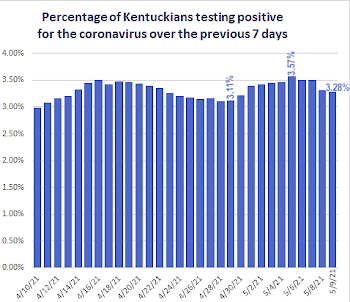Ky. virus numbers decline slightly after a rise; McConnell says masking is getting complicated but getting vaccinated is not

Kentucky Health News graph; click on it to enlarge
—–
By Al Cross
Kentucky Health News
Measures of the pandemic in Kentucky ebbed again Sunday, confirming a downward trend after a recent rise.
The percentage of Kentuckians testing positive for the virus fell for the fourth straight day, to 3.28%, and the state reported only 195 new cases of the coronavirus, the lowest in five weeks. That lowered the seven-day rolling average by 25, to 547 per day, the lowest in 11 days.
The state’s daily rate of new cases over the last seven days is 10.5 per 100,000 residents, down for the fifth day in a row. Counties with rates more than double that rate were Powell, 57.8; Montgomery, 51.2; Lewis, 26.9; Bath, 25.1; Rockcastle, 23.1; Hickman, 22.8; Grayson, 22.7; Simpson, 22.3; and Estill, 22.3.
The New York Times ranks Kentucky’s new-case rate 23rd among the states, but the state ranks much higher in the paper’s ranking of new-case trends over the last 14 days; only four states had higher rates of increase than Kentucky’s 9%: Wyoming, 12%; Arkansas, 17%; Hawaii, 18%; and New Mexico, 18%. Indiana is the only other state with an increase, 6%; West Virginia ranks next, with a decline of 2%.
Kentucky ranks 29th among the states in the percentage of population that is fully vaccinated, at 34%. Ohio, at 35%, and Virginia, at 37%, are the adjoining states with higher percentages.
The state reported eight more Covid-19 deaths, all from regular health-department reports, bringing Kentucky’s death toll from the disease to 6,586. Over the last seven days, the state has averaged eight deaths per day; over the last 14 days, the average is nine per day. On weekends, the state does not issue itemized lists of fatalities by age, sex, county and date of death.
Senate Republican Leader Mitch McConnell kept telling audiences around the state to get vaccinated against the virus. Asked by Renee Shaw of KET if Donald Trump, in whose presidency the vaccines were developed in record time, should have done more to encouraged his supporters to get shots, McConnell said “It’s not just Republican men” who are hesitant about getting a jab. “We have a problem with younger women as well, because there are rumors floating around on the internet that it somehow interferes with fertility . . . We just have to keep talking about this and encouraging people, regardless of what their reservations are.”
Asked what he thinks now of mask wearing, which some of his fellow Republicans say vaccinated people no longer need to practice, the longtime mask advocate said he wears a mask “depending on where I am.” He said the subject “is getting complicated now . . . I think the American people are getting impatient with that . . . What is not complicated is, we need to get shots in arms. Every American who’s eligible needs to do that . . . Do it for your neighbor, if not for yourself; do it for your family, if not for yourself.”
In other pandemic news Sunday:
- Kentucky’s hospitals reported 396 Covid-19 patients, 21 fewer than Saturday; 114 of them were in intensive care, up 7; and 51 were on a ventilator, up 2.
- Counties with five or more new cases were Jefferson, 44; Fayette, 26; Rockcastle, 6; and Grayson, Madison and Powell, 5.
- Dr. Anthony Fauci said the acknowledgement by the Centers for Disease Control and Prevention that the virus can aerosolize, and spread beyond six feet of an infected person, means there needs to be an emphasis on proper ventilation and following the CDC recommendations to wear masks indoors. He said it is “quite possible” that use of masks will become seasonal, saying the U.S. has had a “practically non-existent flu season” because of precautions taken against the coronavirus.
- The other side of that coin is that fewer people than usual developed immunity to flu strains this year, and that could result in more flu cases than usual next winter, several experts told Lauren Dunn of NBC News.